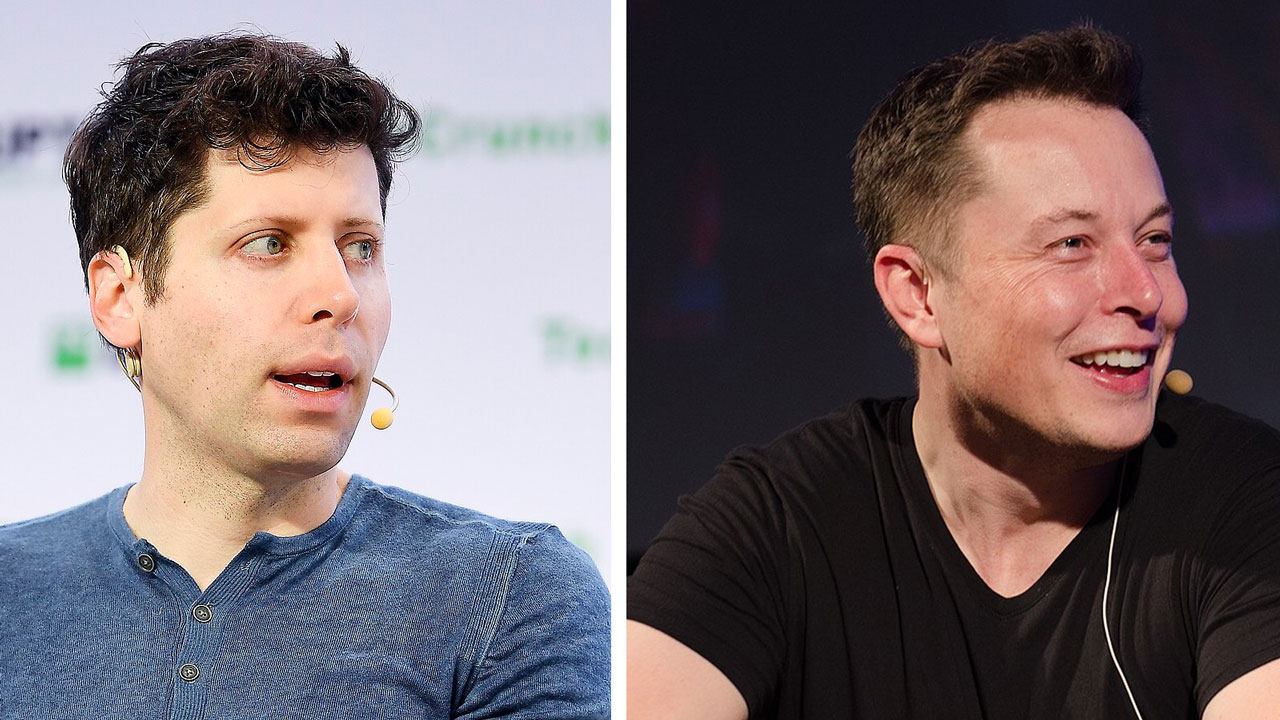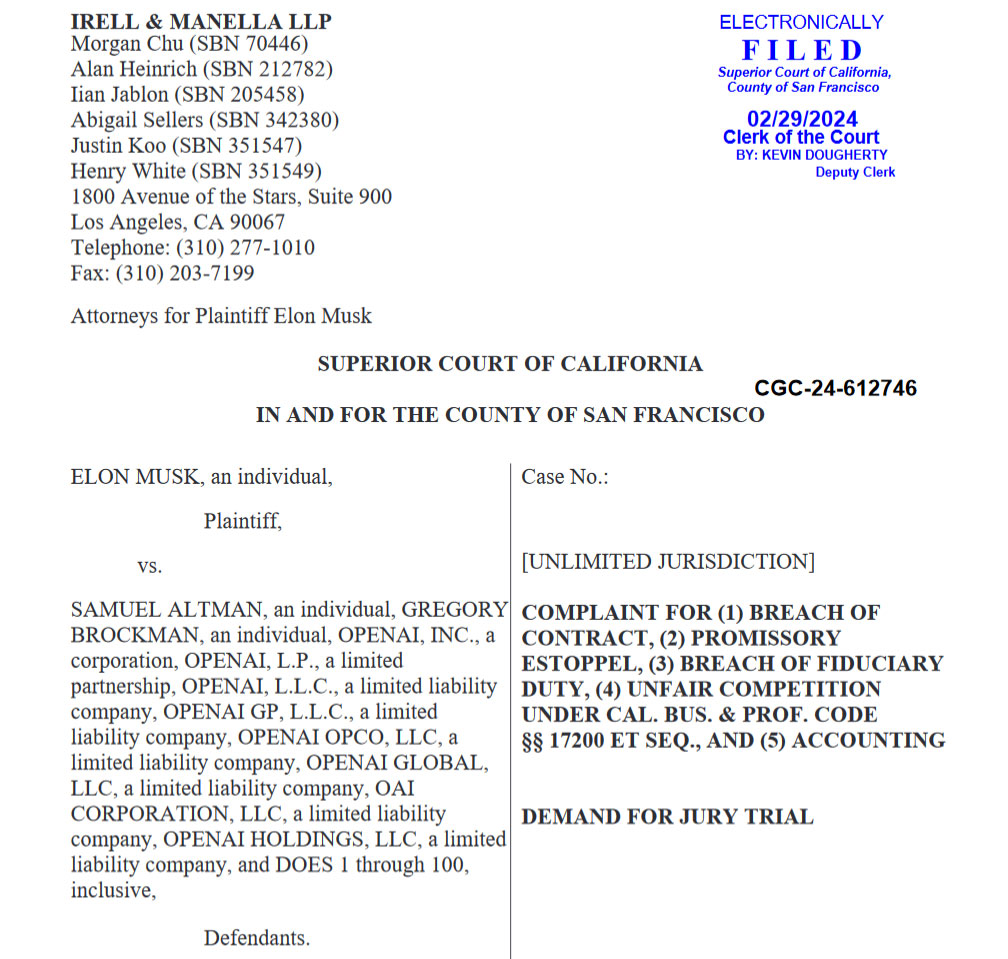Elon Musk sues OpenAI - alleging breaches of the founding agreement
The switch from a non-profit to a for-profit company seems to be the main grievance.

Lawyers acting on behalf of Tesla boss Elon Musk have filed a lawsuit against OpenAI. Naming the CEO and the president of OpenAI, Sam Altman and Greg Brockman, respectively. The crux of the Superior Court of California suit is the allegation that OpenAI’s founding agreement has been breached. Summing up the case in non-legalese terms, Musk is irritated that Altman and Brockman switched OpenAI from a non-profit to a for-profit organization despite assurances they would not. Musk also raises concerns about unchecked Artificial General Intelligence (AGI) being “a grave threat to humanity.”
Elon Musk was the co-founder and an early backer of OpenAI, dating back to 2015. We recently highlighted this fact as new images of Jensen Huang’s visit to the then-budding AI company to donate the world’s first DGX-1 server were shared on social media. Musk reminds us of this early work in the lawsuit and claims a “crucial role” in nurturing OpenAI. However, a chasm started to form between the leadership of OpenAI and Musk from 2017 to 2019, after disagreements over a perceived change of direction at the pioneering artificial intelligence non-profit.
Fissures in the Musk – OpenAI relationship surfaced in 2017 when the Tesla boss first clashed with Altman and Brockman over potentially commercializing the company. At the time, Musk was still the largest financial backer of OpenAI, and firmly requested that the company continue to operate as a non-profit, or those wanting profits quit and go and do their own thing. Altman is said to have responded that “[I] remain enthusiastic about the non-profit structure!” and Brockman followed suit. This non-profit path was seemingly followed through 2018 when Altman submitted a draft charter that described OpenAI’s mission as to ensure that AGI “benefits all of humanity.” Musk’s donations to OpenAI petered out with $3.48 million given in 2019. This was just a fraction of the sums donated in previous years which added up to over $44 million in total.
The next big event on the timeline was the release of the new generation GPT-4 in March 2023. Musk’s lawyers highlight that the development of AI into AGI was underlined with this release, as this LLM was “better at reasoning than average humans.” Two other quite momentous events were to be seen in the story of OpenAI in the same year. We saw the ousting and reinstatement of Sam Altman (and Brockman), and it became very clear how important OpenAI’s commercial relationship with Microsoft was (and is).
Musk’s lawsuit leans heavily into this relationship, painting it as an undesirable development which also goes against the grain of OpenAI’s founding agreement. "In reality, however, OpenAI, Inc. has been transformed into a closed-source de facto subsidiary of the largest technology company in the world: Microsoft," the lawsuit alleges. "Under its new Board, it is not just developing but is actually refining an AGI to maximize profits for Microsoft, rather than for the benefit of humanity. Its technology, including GPT-4, is closed-source primarily to serve the proprietary commercial interests of Microsoft."
The 2023 events were, therefore, a “stark betrayal of the Founding Agreement,” says the legal complaint filed by Mr Musk. Moreover, the change of tack by OpenAI is compared to an Amazonian forest conservation charity deciding to become a logging company.
OpenAI is still the leader in AI, though big tech rivals like Google Gemini / DeepMind, Grok, and Anthropic are gaining strength. There are even rumors of an Apple GPT in the offing.
Get Tom's Hardware's best news and in-depth reviews, straight to your inbox.
It is going to be interesting to watch this lawsuit progress, with the clash of the tech titans and personalities involved in it, and the potentially immense repercussions delivered by its conclusion.

Mark Tyson is a news editor at Tom's Hardware. He enjoys covering the full breadth of PC tech; from business and semiconductor design to products approaching the edge of reason.
-
hotaru251 Reply
so long as there is a physical contract signed by them about the non profit agreement.Pierce2623 said:Just reading the article, it seems like Muskrat has a pretty good case, for once.
verbal agreements never hold up in business as you can't really prove them. -
JamesJones44 Musk is nutty, but on this one he's not wrong. Whether he can win this though, I'm skeptical.Reply -
vanadiel007 Let's put AI to the test and let an AI lawyer from OpenAI fight it out with an AI lawyer from Tesla AI.Reply
If all goes well whichever AI is the best will win the case.
It will be a true test of how well AI can reason, think, adapt and strategize. -
slightnitpick Reply
You can if there's documentation. As we've seen with the SEC and shareholder lawsuits, even tweets count for documentation. And a written charter is better than a tweet.hotaru251 said:so long as there is a physical contract signed by them about the non profit agreement.
verbal agreements never hold up in business as you can't really prove them. -
hotaru251 Reply
yes, but from all posts about it there is no mention of anything being made except verbally. "but they said" doesn't hold up in a court as it is impossible to prove.slightnitpick said:You can if there's documentation. As we've seen with the SEC and shareholder lawsuits, even tweets count for documentation. And a written charter is better than a tweet. -
Blastomonas I have some sympathy for this cause. Especially enjoyed the analogy of OpenAI being compared to an Amazon logging company.Reply
I imagine that future versions of Windows will be written by AI. -
abufrejoval Both Tesla and OpenAI are essentially trying to sell knowledge gathered from humans without consent or reward and then declared proprietary and exclusive after being transferred and run on silicon.Reply
He can't win without losing even if he doesn't admit that he doing the same.
But most urgently we need regulation to ensure everyone's right to stop feeding the data robbers: no device may forward data by default and without informed non-discriminating consent from the owner! -
Pierce2623 Reply
Nobody’s writing or anything else should be used to train these LLMs without paying the people that produced that content. Also, Tesla, I would argue, is doing much less attempted sales of other people’s knowledge than something like ChatGPT. Tesla’s AI stuff is like:self driving cars, self regulating battery systems in cars. I mean maybe they’re trying to monetize other people’s work like the LLMs are but I haven’t really seen it. All that being said, I still find Elon Musk to be a complete tool. I just think maybe he’s right about this OpenAI thing.abufrejoval said:Both Tesla and OpenAI are essentially trying to sell knowledge gathered from humans without consent or reward and then declared proprietary and exclusive after being transferred and run on silicon.
He can't win without losing even if he doesn't admit that he doing the same.
But most urgently we need regulation to ensure everyone's right to stop feeding the data robbers: no device may forward data by default and without informed non-discriminating consent from the owner!
